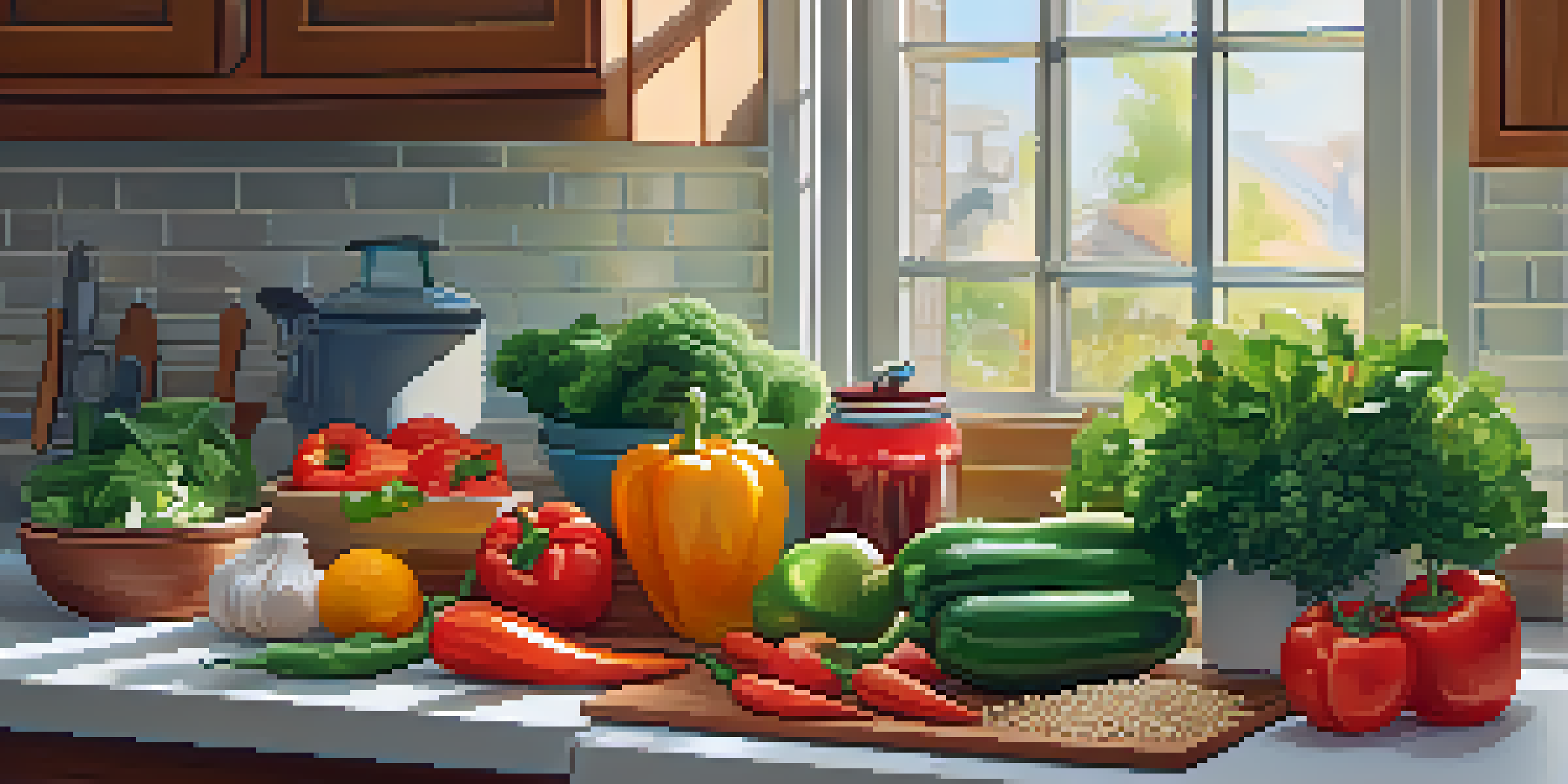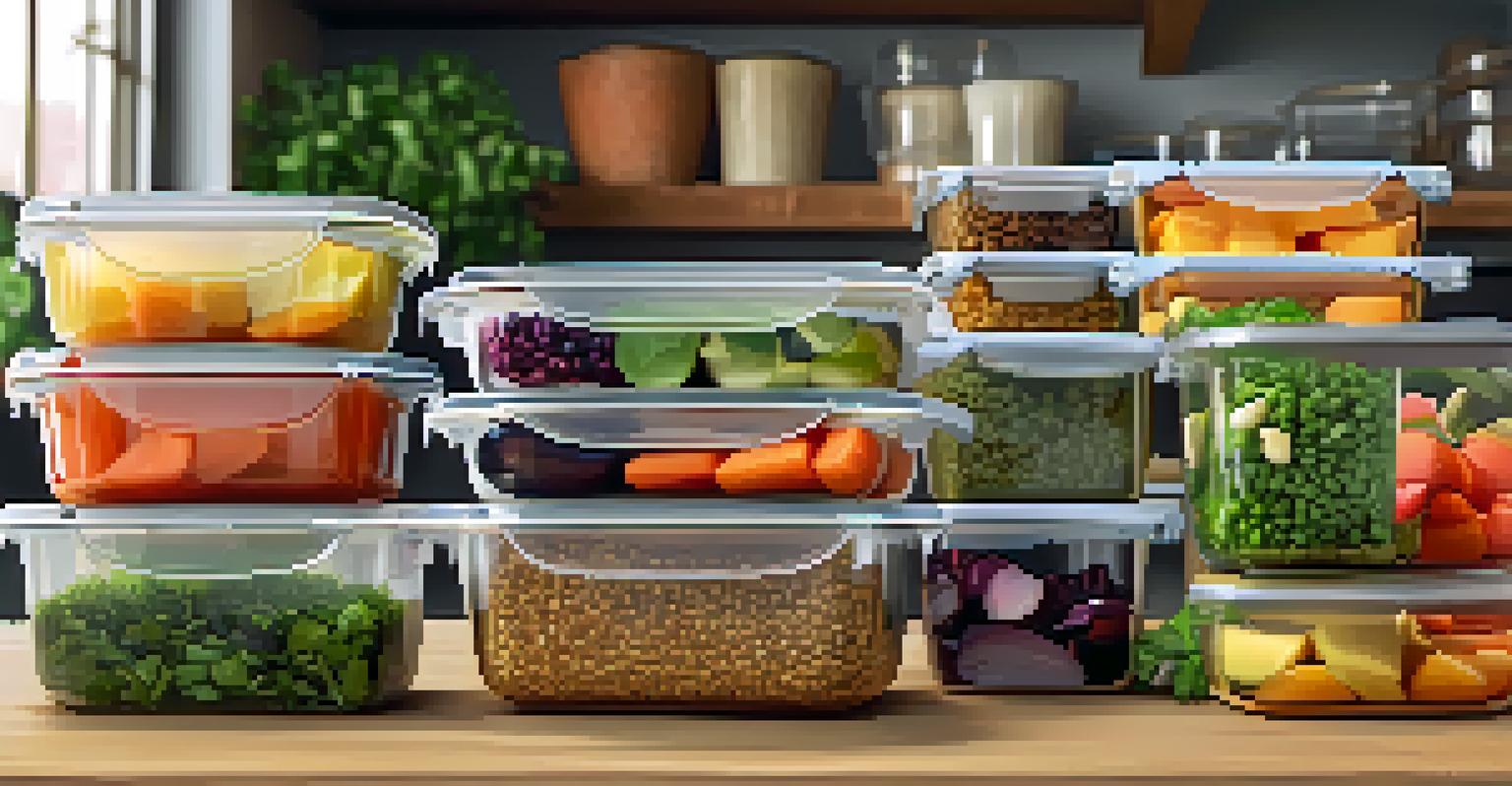A Guide to Vegan Meal Prep: Tools and Techniques

Understanding the Basics of Vegan Meal Prep
Vegan meal prep is all about planning and preparing plant-based meals ahead of time. This approach not only saves you time during busy weekdays but also helps you stay committed to a vegan lifestyle. By preparing meals in advance, you’re less likely to reach for unhealthy options when hunger strikes.
The secret of getting ahead is getting started.
One of the biggest perks of meal prepping is the variety it allows. You can experiment with different ingredients and flavors, ensuring that your meals are both nutritious and exciting. Think of meal prep as a way to embrace creativity in the kitchen while promoting healthier eating habits.
To get started, it's helpful to choose a few staple recipes that you enjoy. This way, you can gradually build up your meal prep skills without feeling overwhelmed. Plus, having a go-to list of recipes makes grocery shopping a breeze!
Essential Tools for Vegan Meal Prep Success
Having the right tools can make a world of difference in your meal prep journey. Start with basic kitchen essentials like sharp knives, cutting boards, and measuring cups. These tools help streamline the chopping and measuring process, allowing you to work more efficiently.

In addition to the basics, investing in high-quality storage containers is key. Look for BPA-free plastic or glass containers that can withstand heat and are dishwasher safe. These containers not only keep your meals fresh but also make it easy to grab and go when you're in a hurry.
Plan Ahead for Vegan Meals
Meal prepping saves time and helps maintain a healthy vegan lifestyle by planning and preparing meals in advance.
Don’t forget about appliances that can simplify your prep work! A food processor, for instance, can save you time chopping vegetables or making sauces. Similarly, an Instant Pot or slow cooker can be a game-changer for cooking grains and legumes.
Planning Your Meals: The What and When
Meal planning is a crucial step in the meal prep process. Start by deciding which meals you want to prepare for the week—breakfast, lunch, and dinner. Consider your schedule and select meals that fit your lifestyle, such as quick lunches for busy workdays or hearty dinners for relaxing evenings.
You don’t have to be great to start, but you have to start to be great.
Once you've chosen your meals, create a shopping list based on the ingredients you’ll need. This list will save you time at the grocery store and help you avoid impulse purchases. Plus, having a well-thought-out shopping list ensures you have everything you need to stick to your meal prep plan.
It's also smart to consider batch cooking. Prepare larger quantities of certain meals or ingredients that can be used in various recipes throughout the week. This approach maximizes efficiency and minimizes food waste.
Batch Cooking: Maximizing Your Time and Efficiency
Batch cooking is one of the best techniques for maximizing your meal prep efforts. It involves cooking large portions of food at once, then storing them for later use. This method is especially useful for staple items like grains, beans, and roasted vegetables.
When batch cooking, choose recipes that freeze well, such as soups, stews, or casseroles. This way, you can enjoy homemade meals even on the busiest days without the stress of cooking from scratch. Plus, having a stocked freezer means fewer trips to the grocery store!
Batch Cooking for Efficiency
Batch cooking allows you to prepare large portions of food at once, making it easier to enjoy homemade meals throughout the week.
To make batch cooking easier, try dedicating one day a week to prep. Spend a few hours in the kitchen cooking and portioning out meals. Before you know it, you'll have a week's worth of delicious vegan meals ready to go!
Storing Your Prepped Meals: Best Practices
Proper storage is a vital part of making your meal prep successful. After cooking, allow your meals to cool before transferring them to storage containers. This helps prevent condensation, which can lead to sogginess or spoilage.
Label your containers with the date and contents, so you can easily identify what you have on hand. This simple step not only keeps your fridge organized but also helps you use up older meals before they go bad. It’s all about keeping things fresh and enjoyable!
When it comes to freezing meals, use airtight containers or freezer bags to prevent freezer burn. Remember to leave some space in the containers for expansion as the food freezes. This way, your meals will taste just as good when you reheat them!
Creative and Versatile Vegan Meal Ideas
One of the joys of vegan meal prep is the variety of dishes you can create. Think outside the box with recipes that can be easily adapted, like Buddha bowls, stir-fries, and grain salads. These meals allow you to mix and match ingredients based on what you have available.
For instance, a basic quinoa salad can transform by adding roasted vegetables, chickpeas, or a zesty dressing. The key is to use seasonal produce and pantry staples to keep your meals fresh and exciting. This way, you won't get bored with your meal prep choices.
Storage Tips for Freshness
Properly storing prepped meals in airtight containers and labeling them helps keep your meals fresh and organized.
Additionally, consider making sauces or dressings in bulk to elevate your dishes. A simple tahini dressing or homemade pesto can add a burst of flavor to your meals, making even the simplest ingredients shine!
Staying Motivated: Tips for Successful Meal Prep
Staying motivated on your meal prep journey can be challenging, but it's essential for long-term success. Start by setting realistic goals for yourself, whether it’s prepping just a few meals a week or trying out new recipes. Celebrate your progress, no matter how small!
Joining a meal prep community, either online or in person, can also provide support and inspiration. Sharing ideas with others who are on the same journey can help keep your motivation high and introduce you to new techniques and recipes.

Finally, don’t be afraid to experiment. Meal prepping doesn’t have to be rigid—find joy in trying new flavors and ingredients. Embrace the process, and remember that each week is a new opportunity to refine your skills and discover what works best for you.